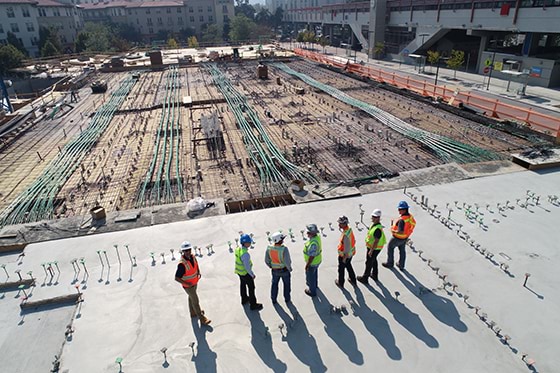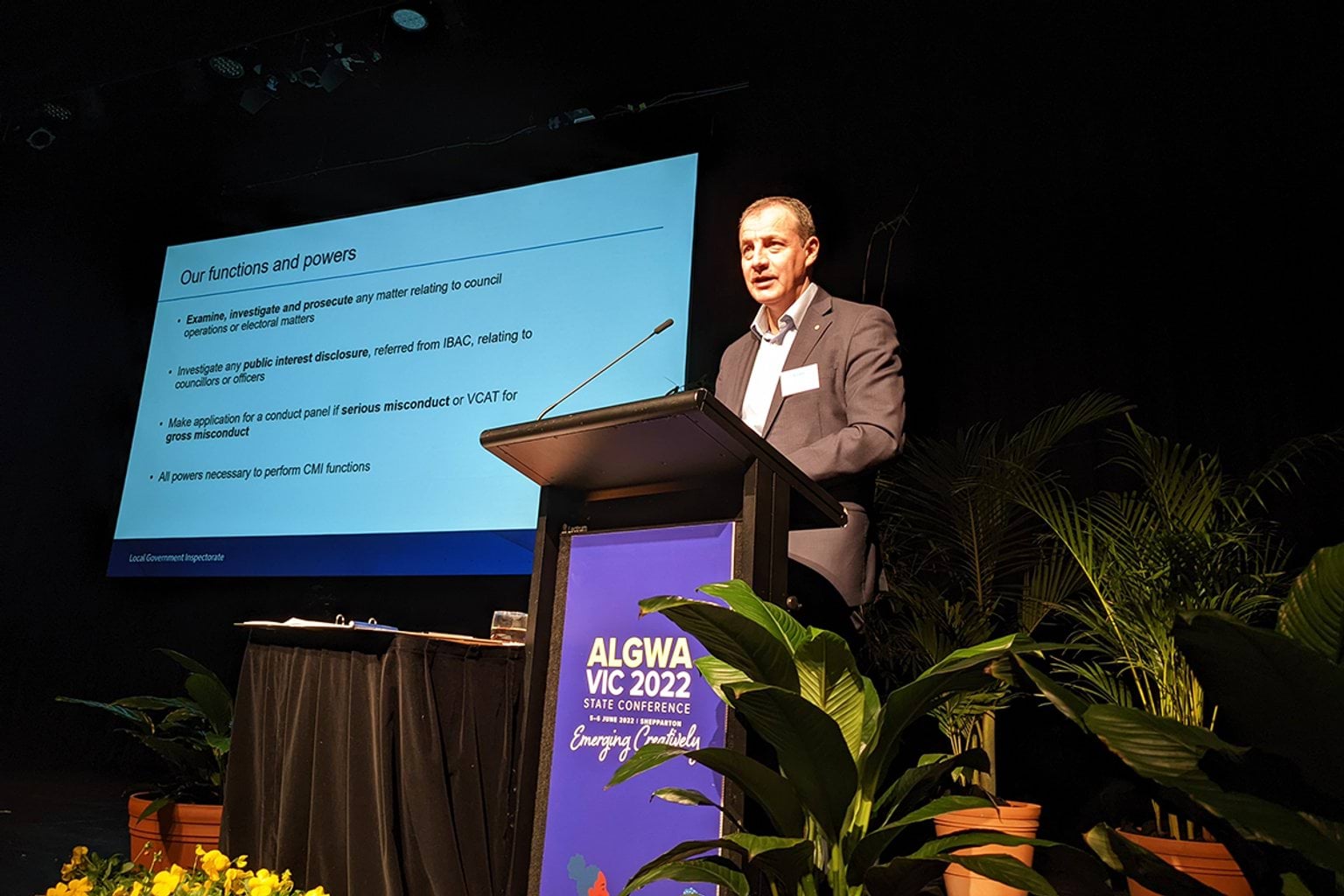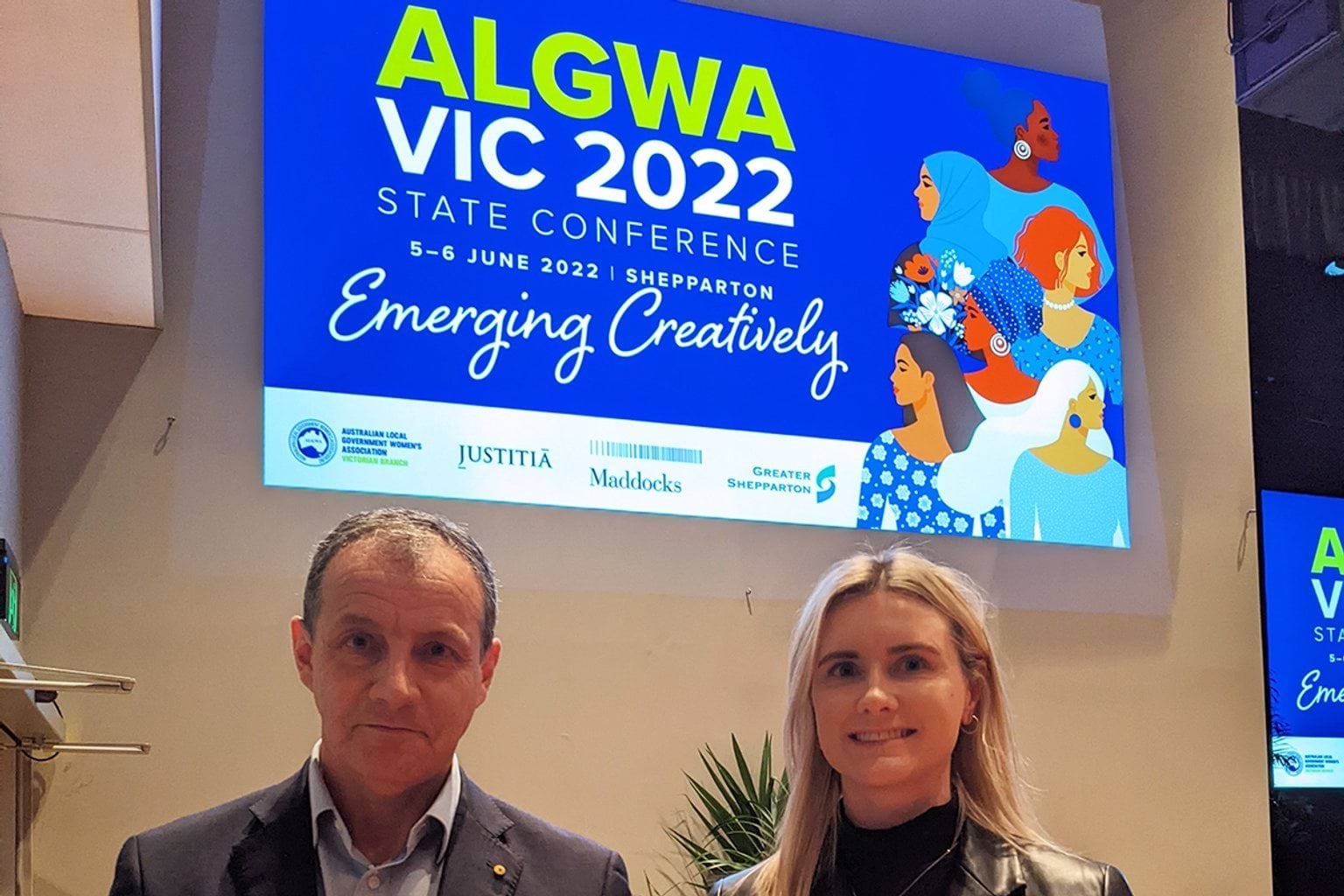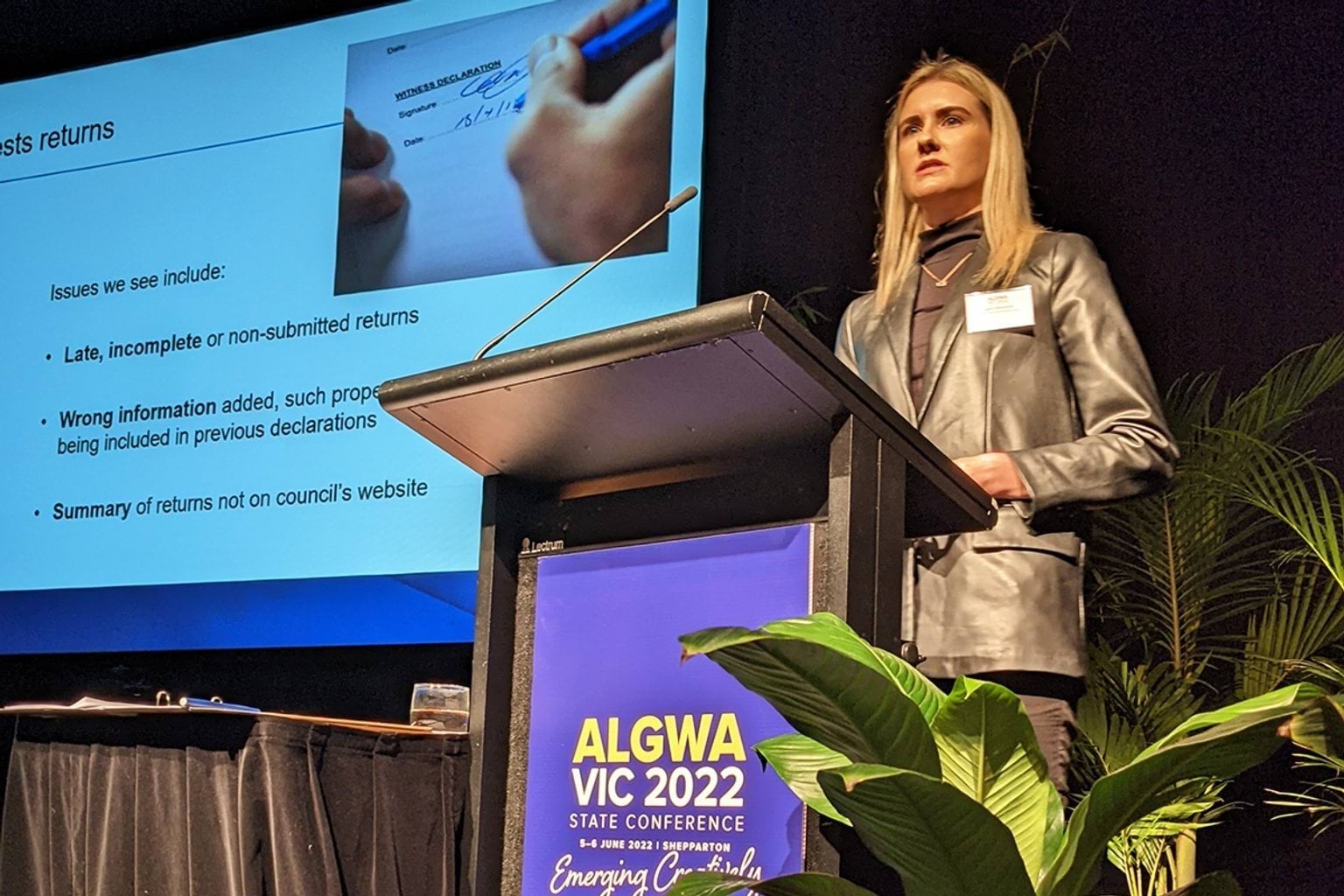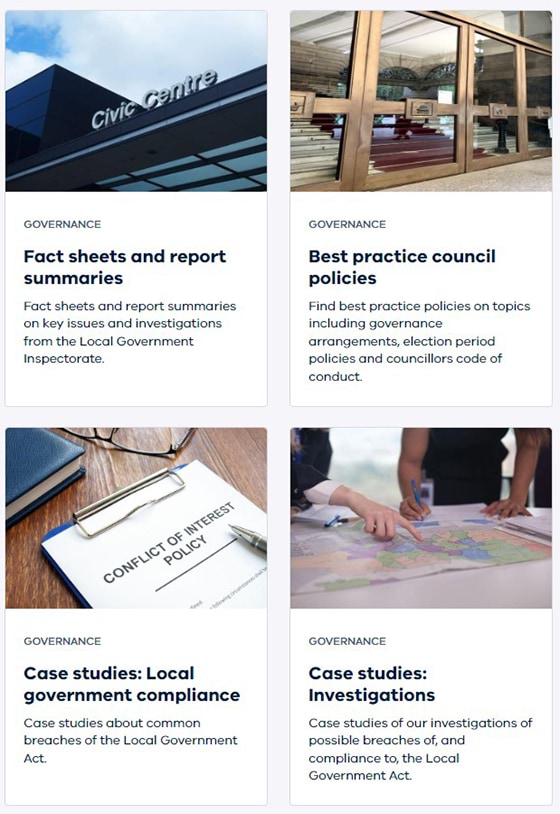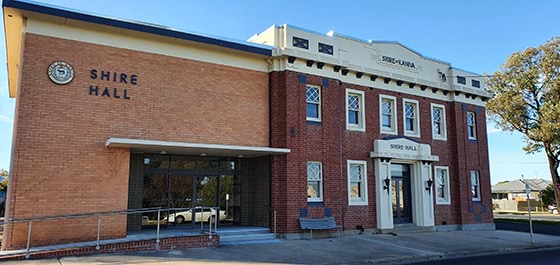- Date:
- 20 July 2022
Welcome to the winter edition of our integrity matters newsletter.
Winter kicked off in style for the Inspectorate when we took part in the Australian Local Government Women’s Association (ALWGA) Victorian branch conference in Shepparton. Four of our team were pleased to have the opportunity to meet councillors and officers from across Victoria at this major event.
We were also able to circulate some of our new fact sheets at the conference. These fact sheets aim to simplify complex issues to help with compliance.
In this issue, we take a look at two topics which have been raised with us in recent months: whether councillors should be interacting with developers, and the reasons and methods for standing down a councillor.
And finally, we have been hitting the road to try to visit as many councils as possible. We have clocked up some kilometres to visit Yarriambiack and West Wimmera councils as well as presenting to Murrindindi, Nillumbik and Shepparton.
Michael Stefanovic AM
Chief Municipal Inspector
Interactions with developers must be appropriate
Should a councillor meet with developers? This is a question we are often asked about in our integrity work – especially as the issue has received more attention in recent years.
Councillors are often required to make decisions about planning and developments in their municipality and as part of seeking information, may interact with developers on upcoming projects.
The community is often concerned about the potential influence of developers especially when there are large sums of money at stake. This is potentially an issue with councils on Melbourne’s outer fringe experiencing population growth.
Operation Sandon has thrown the issue into the spotlight. The Independent Broad-based Anti-corruption Commission (IBAC) operation held public hearings in 2019 and 2020 into allegations of serious corrupt conduct in relations to planning and property development decisions at the City of Casey. The hearings looked at the transparency and integrity of planning and property development decision making, including:
- donations or in-kind assistance to election candidates
- donations, gifts, pro bono services or other hospitality
- the use of professional lobbyists or planning consultants.
Until IBAC’s report is released with specific recommendations, councils can still work to improve transparency and minimise the risk of corruption in relation to planning and property development decisions in their own communities.
1. Councillors should avoid comment before a decision
The role of council staff is to assess the application and provide an impartial, professional opinion and recommendation to the councillors. The role of an elected councillor in the decision-making process is to approve or decline the application on the information and recommendation provided by council staff. To avoid prejudicing the eventual decision, councillors must not make up their minds about a development application until they have read the officer's reports and heard all sides of the debate.
Any involvement a councillor has with a development application during its assessment has the potential to damage the integrity of the final determination. It is important that councillors avoid making public comments that could be seen as supporting or opposing an application.
In addition, councillors should not be seen to be trying to influence the public by commenting on the application or signing petitions during the public comment period.
2. Councillors should avoid meeting developers one-on-one
We recommend that councillors should not be meeting with developers one-on-one if they have an application before council or are about to make one. A one-on-one meeting with a developer runs the risk of a councillor being accused of bias.
Requests for a meeting should go through official council channels, such as a generic council inbox. Councillors should only meet with a developer with a council officer present. Alternatively, councils could require that all councillors are invited to any meeting with developers.
If councillors were approached as the ward representative, they might still need to engage with developers. However, it is important for councillors to be mindful if a developer has or will soon have an application before council.
3. Councillors should avoid accepting gifts and hospitality from developers
Councillors should be open and transparent in their dealing with developers. This will protect them from any situations which may create a conflict of interest. They should avoid accepting hospitality or gifts of any sort from developers and lobbyists.
Councillors also need to consider their council’s gift policy if they do accept a gift of any kind from a developer or planning applicant.
It is important for councillors to remember that they need to make strategic decisions which benefit the municipality – but they need to ensure they are complying with existing planning schemes.
4. Councils should create a policy to guide councillor interactions with developers
Creating a policy which clearly sets out how councillors should interact with developers will create the ground rules for interactions, help with transparency and manage community expectations. Everybody will understand what is expected and this will aid oversight.
5. Councils should keep a register of councillor interactions with developers
Keeping a record of the interactions councillors have with developers will ensure any meetings are open and transparent and available for the public to see.
Empowering women in focus at annual conference
The Inspectorate took part in the Australian Local Government Women’s Association (ALGWA) Victorian branch state conference on Monday 6 June.
The annual conference was held in Shepparton this year and attracted about 150 people to hear from a range of speakers about issues including Covid-19, the Indigenous experience, Shepparton’s path through the pandemic and creating workplaces that attract and benefit women.
Chief Municipal Inspector Michael Stefanovic and Senior Investigator Laura Majewski spoke about our work in promoting integrity, including case studies about conflict of interest and how councils have managed the issue of councillor interference in operational matters.
We were also joined by our communications advisors Steve Pogonowski and Jane Gillard. We offered councillors and council staff copies of our new fact sheets, reports and report summaries.
The conference was a great opportunity for councillors and staff to speak to us about issues they face and seek our advice. It was also a chance for us to better understand the challenges and opportunities facing the local government sector in 2022.
We thank the ALGWA executive for the opportunity to take part in the conference – one of the largest gatherings of local government in Victoria. The next ALGWA conference will be held on the Mornington Peninsula on 18–20 May 2023.
Former Benalla Shire councillor pleads guilty
Former Benalla Shire Councillor William van Wersch pleaded guilty to six charges related to personal interest return non-disclosures at a plea hearing at Benalla Magistrates Court on 5 July.
Mr van Wersch, who unsuccessfully stood for re-election in 2020 after one term, was fined $5,000, without conviction, and ordered to pay legal costs of $3,500.
He pleaded guilty to six charges, brought by the Inspectorate, in relation to his personal interests returns, which is a requirement under the Local Government Act. While the offences occurred under the 1989 Act, declaring personal interests continues to be a requirement under the Local Government Act 2020.
The court heard that, during his four-year term, Mr van Wersch failed to submit two interest returns within the required timeframe.
He also failed to disclose a number of personal interests in five of his ordinary returns, which included companies in which he held office or a beneficial interest, as well as land interests and trust interests.
The Inspectorate laid 18 charges against van Wersch related to the non-disclosures, which were reduced after the defendant’s offer of a guilty plea on six rolled-up charges.
Councillors and other relevant people in local government must declare their personal interests under the Local Government Act. Declaring interests allows the public to see the shareholdings, trusts, business associations and other private interests of the people making decisions at councils.
Chief Municipal Inspector Michael Stefanovic AM said: “Submitting accurate personal interests returns is vital for the transparency of local government and a way for the community to ensure that decisions are made in an impartial manner for the benefit of the community and not for personal gain.
“We welcome the decision by the Magistrates’ Court. Communities have the right to expect the highest levels of integrity from their councillors. It also sends a message to councillors across Victoria that submitting accurate personal interests returns is essential.”
The Inspectorate identified issues with Mr van Wersch’s personal interests returns as part of a large project started in mid-2020. The project examined 4,600 personal interests returns from 650 councillors at 78 councils for compliance with the requirements of the Local Government Act 1989.
We subsequently found issues with Mr Van Wersch’s returns which led to the charges.
Key issues simplified in new fact sheets
The Inspectorate has released new fact sheets to help councils and councillors improve their compliance with the Local Government Act 2020. The fact sheets are part of a range of resources for councils, which are available on our website and give practical advice for councils, councillors and governance staff.
The fact sheets are simple explainers of often complex processes and legislation. They are available to download and print out or read online.
The new fact sheets cover the following topics:
- Conflicts of interest for councillors
- Our powers and responsibilities
- Governance examinations
- Personal interests returns
- Campaign donation returns
Recent feedback from council governance staff, CEOs and councillors – during informal discussions, at council briefings and through our online survey – has called for clear guidance and information.
Our advice and information is in addition to the guidance material being provided or in development by Local Government Victoria. It is based on information we have received and issues we have observed during our investigations and examinations.
Our staff are regularly asked for information on topics such as what comprises a conflict of interest under the Act; how we conduct investigations or governance examinations; and when personal interest disclosures need to be made.
The fact sheets aim to answer some of those questions and assisting complainants, councils, the community and the media in understanding our work and key aspects of legislation.
In addition to the fact sheets, we have also provided other information, including summaries of our reports so they are more accessible to councillors, council staff and the community.
Our report summaries so far include:
- Personal interests returns: Encouraging disclosure and increasing transparency
- Social media fuels rise in complaints during 2020 council elections
- Protecting integrity: Leading the way – Managing the employment cycle of a council CEO
Our website also contains other resources such as case studies, best-practice council policies and trends in examination trends.
We aim to increase the number of materials in the coming months. If you have any suggestions for additional resources, please get in touch.
View all our fact sheets and report summaries.
How a councillor can be stood down in Victoria
We have received many enquiries or requests to have a councillor stood down for perceived or actual breaches or offences under the Local Government Act.
A Victorian councillor can be stood down for a number of reasons and the 2020 Act contains two pathways by which this can be done.
Ministerial intervention
The first pathway created by sections 224–228 of the Act allows the Minister for Local Government to intervene. This pathway can be taken when one of the following is initiated:
- an application to a Councillor Conduct Panel for a finding of serious misconduct against a councillor
- an application has been made to the Victorian Civil and Administrative Tribunal (VCAT) alleging gross misconduct by the councillor
- a Commission of Inquiry into the council or the councillor
- an application to the Supreme Court to oust the councillor from office.
The Minister must also have reason to believe that the councillor:
- is creating a serious risk to the health and safety of councillors, council staff or other persons; or
- is preventing the council from performing its functions.
When these elements are met, the Minister may refer the councillor to the Chief Municipal Inspector or a Municipal Monitor. The investigation findings must be reported to the Minister and councillor within 10 days (or another agreed period). The councillor has an opportunity to respond within five days.
Following this, the Minister may recommend to the Governor in Council that the councillor be stood down for up six months or until finalisation (including a final determination, withdrawal or dismissal) of the relevant Councillor Conduct Panel, VCAT, or Supreme Court application, or the tabling of the Commission of Inquiry report.
David Walker, the Inspectorate’s Senior Investigator, said: “There have been no cases under the new legislation, which came into force in 2020, where a councillor had been stood down through the intervention of the Minister for Local Government”.
Application to VCAT
The second pathway to stand a councillor down is set out in section 229. This is through an application to VCAT by the CMI where the councillor has been charged with a serious offence, which:
- has a maximum penalty is at least 120 penalty units or 12 months’ jail
- is punishable upon first conviction by imprisonment of two years or more for a term; or
- disqualifies them from managing corporations.
VCAT must consider the nature and circumstances of the charge before deciding to stand down the councillor.
If an order to stand down the councillor is made by VCAT, it applies until the proceedings in respect of the charge are finally determined. If the charge is withdrawn or the councillor is not convicted, the order ceases to have effect.
Some examples of where we could use this pathway include a councillor being charged with aggravated assault, a breach of an intervention order or a councillor being disqualified from managing a corporation after a bankruptcy.
Mr Walker said: “If the circumstances warrant the councillor being stood down we can apply to VCAT for an application to stand the councillor down. VCAT would then consider the nature and circumstances of the charge and would then make a decision about whether or not to stand the councillor down.”
He added: “It is important to note that this pathway is not immediate and the case may have to wait for a period of time until it is heard by VCAT.”
Consequences of a councillor being stood down
When a councillor has been stood down, they must not perform any of the functions and duties or exercise the power of a councillor. They cannot attend council meetings, delegated committees or attend council premises.
The councillor’s allowance is also suspended for the duration of the stand down period.
Inspectorate meets with more councils
Inspectorate staff have been out on the road this quarter, visiting councils for face-to-face meetings and also conducting online presentations. Council visits are an important means for improving compliance with the Local Government Act, engaging with the sector and improving awareness of the work of the Inspectorate. It also gives us a better understanding of the issues faced by councils in metropolitan Melbourne and rural and regional Victoria.
In June, our compliance team visited Yarriambiack Shire Council to check on the council’s progress in implementing recommendations made in our investigation report.
While in the north west, we met with West Wimmera Shire Council. Again, our compliance team wanted to check on the progress the council made into implementing the recommendations of the Protecting integrity: West Wimmera Shire Council examination report. While Covid significantly delayed these visits, it was great to reconnect with councils and chat about the improvements they had implemented since the reports were published.
Chief Municipal Inspector Michael Stefanovic AM said: “The complex investigations into West Wimmera and Yarriambiack discovered a range of issues at the councils, which both councils have been working to address. Our compliance checks will help ensure councils are not repeating the mistakes of the past and that they have the correct foundations to comply with the Local Government Act and better serve their communities. The visits also allowed councils staff to seek guidance and advice from our team.”
Meanwhile, we have continued with our program of giving presentations to increase awareness, engage with councillors and senior officers and provide the opportunity to councils to discuss and to ask us questions about issues that affect them.
We presented to Greater Shepparton Shire Council in person and have also continued offering presentations online at councils including Nillumbik and Murrindindi.


